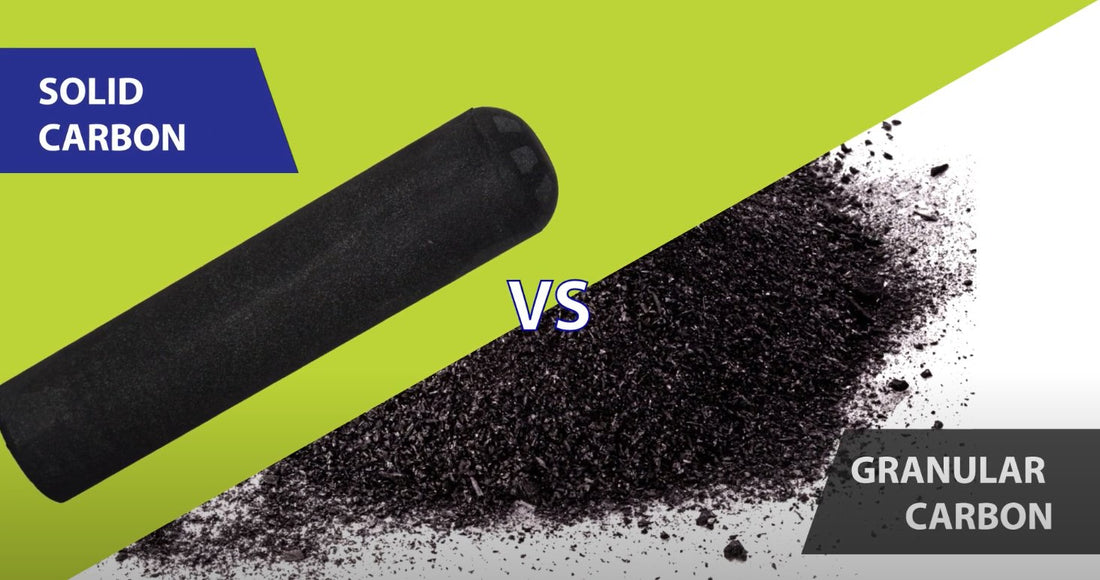Water sources can contain some contaminants that affect your long term health, the taste & smell of the water and other microbiological contaminants that can actually make consumers sick shortly after drinking, for example virus, bacteria, and cysts (giardia & cryptosporidium). Fortunately, there are water filtration products that remove many of the impurities from water. These filters often use carbon. Two dominant carbon filter choices are solid carbon blocks (CB) and granular activated carbon (GAC) filters.
Filter Design
Granular activated carbon filters have loose granules of carbon that look like black grains of sand. Solid block carbon filters have blocks of compressed activated carbon that are formed with the combination of heat and pressure. Both filters are made from carbon that’s ground into small particulate sizes. Solid carbon blocks are ground even further into a fine mesh 7 to 19 times smaller than the granular activated carbon filters.
GAC Has Less Contact Time
Flow channels also develop between the granules in the granular activated carbon filters, leading to less effective filtration as there’s less contact between the water and carbon. Solid carbon blocks are much tighter and won’t even let through microbial cysts like giardia and cryptosporidium. However, solid carbon block filters are so tight that they can often get plugged up with matter, forcing owners to replace them on a more regular basis. This is why when you are using a Brita water pitcher filter (granular carbon), the filter will keep going and going long after it has stopped removing any water contaminants. Why bother?
When comparing carbon block water filters to granulated activated carbon water filters, each type has its strengths and is better suited for different applications. Here's a detailed comparison:

Carbon Block Water Filters
Advantages:
- Efficiency: Carbon block filters are more effective at removing a wider range of contaminants, including sediment, chlorine, volatile organic compounds (VOCs), and certain heavy metals. The compact structure allows for more surface area contact with water.
- Filtration Fineness: These filters can achieve very fine filtration, often down to 0.5 microns, which makes them better at removing fine particulate matter and microorganisms.
- Durability: They generally have a longer lifespan compared to GAC filters due to their dense structure.
Disadvantages:
- Flow Rate: The dense structure can result in a slower water flow rate, which might not be ideal for applications requiring high volumes of water quickly in excess of 15 Gallons Per Minute (GPM).
- Clogging: Because of their fine filtration, they can clog more quickly if the water contains a lot of sediment or large particles. It's best to install a pre-filter / sediment filter prior to a carbon block to preserve it's effective lifespan.
Granulated Activated Carbon (GAC) Water Filters
Advantages:
- Flow Rate: GAC filters generally have a higher flow rate compared to carbon block filters because of the looser structure of the carbon granules.
- Initial Cost: These filters can be less expensive initially due to the simpler manufacturing process.
- Contaminant Removal: They are effective at removing chlorine, bad tastes, odors, and some organic chemicals.
Disadvantages:
- Filtration Efficiency: GAC filters are typically less effective at removing fine particulate matter and microorganisms compared to carbon block filters. The larger granules offer less contact surface area with the water.
- Channeling: Water can create channels through the granules over time, reducing the filter's efficiency as parts of the carbon bed become bypassed.

Which Is Better?
For Residential Use:
- Carbon Block Filters are generally better for household drinking water filtration systems because of their superior contaminant removal capability. They are particularly effective if you need to remove a wide range of contaminants, including very fine particulates and microorganisms.
For Commercial Applications Requiring High Flow Rates Exceeding 20 GPM:
- GAC Filters may be more suitable where higher flow rates are necessary and the primary concern is removing chlorine, bad tastes, and odors, rather than fine particulate matter.
Conclusion
The choice between Carbon Block and GAC filters depends on your specific water quality needs and usage requirements. If you prioritize high contaminant removal efficiency and don't mind a slower flow rate, carbon block filters are the better option. If you need a higher flow rate and are mainly concerned with removing chlorine and improving taste and odor, GAC filters might be more appropriate.
Tradewinds Water offers only the highest quality, NSF certified, carbon block filters manufactured and in the US by Enpress LLC. Each carbon block filter is specifically designed to address a wide range of contaminants, including very fine particulates and microorganisms including arsenic, PFAS and lead. Shop Carbon Block Filters

